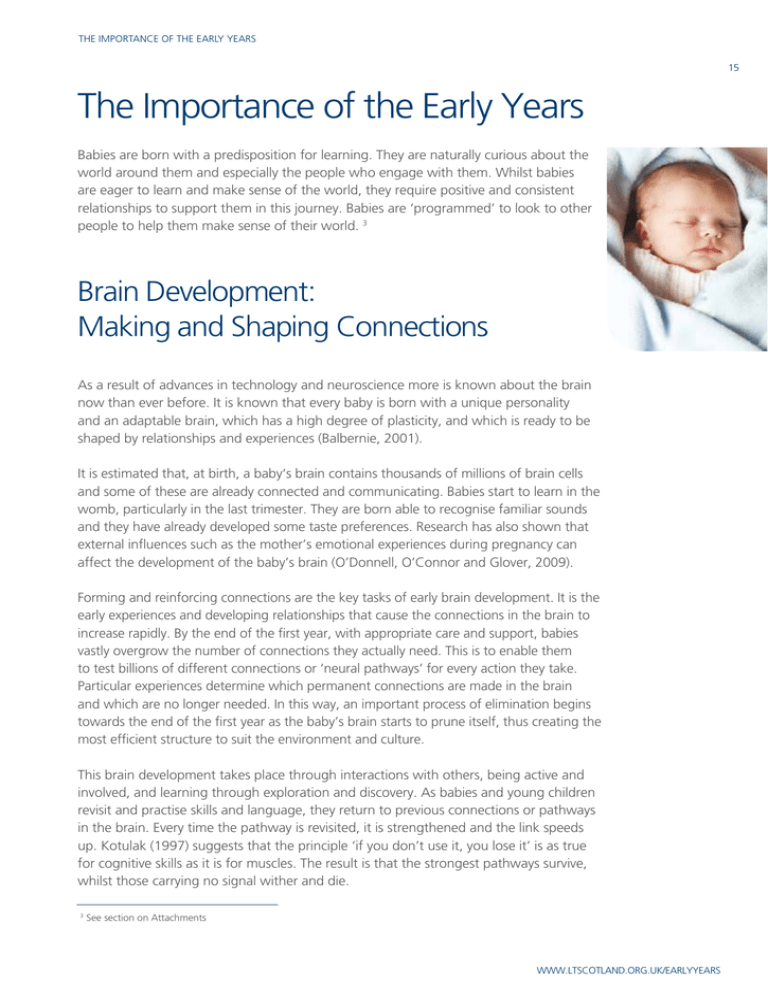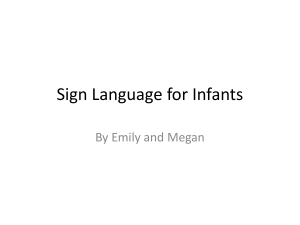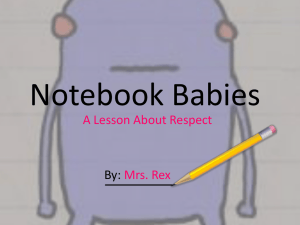The Importance of the Early Years
advertisement

the importance of the early years 15 The Importance of the Early Years Babies are born with a predisposition for learning. They are naturally curious about the world around them and especially the people who engage with them. Whilst babies are eager to learn and make sense of the world, they require positive and consistent relationships to support them in this journey. Babies are ‘programmed’ to look to other people to help them make sense of their world. 3 Brain Development: Making and Shaping Connections As a result of advances in technology and neuroscience more is known about the brain now than ever before. It is known that every baby is born with a unique personality and an adaptable brain, which has a high degree of plasticity, and which is ready to be shaped by relationships and experiences (Balbernie, 2001). It is estimated that, at birth, a baby‘s brain contains thousands of millions of brain cells and some of these are already connected and communicating. Babies start to learn in the womb, particularly in the last trimester. They are born able to recognise familiar sounds and they have already developed some taste preferences. Research has also shown that external influences such as the mother’s emotional experiences during pregnancy can affect the development of the baby’s brain (O’Donnell, O’Connor and Glover, 2009). Forming and reinforcing connections are the key tasks of early brain development. It is the early experiences and developing relationships that cause the connections in the brain to increase rapidly. By the end of the first year, with appropriate care and support, babies vastly overgrow the number of connections they actually need. This is to enable them to test billions of different connections or ‘neural pathways’ for every action they take. Particular experiences determine which permanent connections are made in the brain and which are no longer needed. In this way, an important process of elimination begins towards the end of the first year as the baby’s brain starts to prune itself, thus creating the most efficient structure to suit the environment and culture. This brain development takes place through interactions with others, being active and involved, and learning through exploration and discovery. As babies and young children revisit and practise skills and language, they return to previous connections or pathways in the brain. Every time the pathway is revisited, it is strengthened and the link speeds up. Kotulak (1997) suggests that the principle ‘if you don’t use it, you lose it’ is as true for cognitive skills as it is for muscles. The result is that the strongest pathways survive, whilst those carrying no signal wither and die. 3 See section on Attachments www.LTScotland.org.uk/earlyyears the importance of the early years 16 This process is commonly known as ‘hard-wiring’ and 90% of the hard-wired connections will be complete by the age of 3. This process is fundamental to the critical importance of the early years as it explains and illustrates the long-lasting impact of early experiences. Every Child Deserves the Best Start Babies are born ready to adapt and create connections to suit the environment they meet. This ability also makes humans vulnerable when placed in less positive circumstances, where the negative impact may last a lifetime. As children grow into mature adults, they may face challenges such as unexpected transitions or sudden changes in life circumstances. These challenges provide children with the opportunity to learn how to regulate emotions effectively, manage stress and develop the social, behavioural, and cognitive skills needed to overcome obstacles. Whilst some experience of manageable stress is important for healthy development, research shows that high levels of prolonged parental stress, trauma and neglect can impact negatively on babies and young children in respect of brain development (Talge, Neal and Glover, 2007). High levels of stress can actually weaken the connections in the brain or can cause brain cells to die. Babies need consistent relationships, firstly to create the necessary pathways in the brain, and then to ensure that these connections become hard-wired. Babies and young children who have positive emotional bonds with adults produce consistently lower levels of the stress hormone cortisol. It is therefore important that staff recognise the potentially powerful impact that their practice can have in supporting children so that they can go on to develop positive and healthy relationships throughout life. It is essential that staff working in early years settings recognise the need for all service providers to work together with families in order to get it right for every child. All adults working with Scotland’s youngest children must demonstrate, through their practice, their awareness that every child has the right to a positive start in life through respectful relationships which show responsive care. In this way, Scotland’s youngest children can be nurtured to develop a capacity for love, empathy, respect, resilience, positive relationships and the chance to succeed.4 4 See section on Role of Staff PRE-BIRTH TO THREE: POSITIVE OUTCOMES FOR SCOTLAND’S CHILDREN AND FAMILIES




